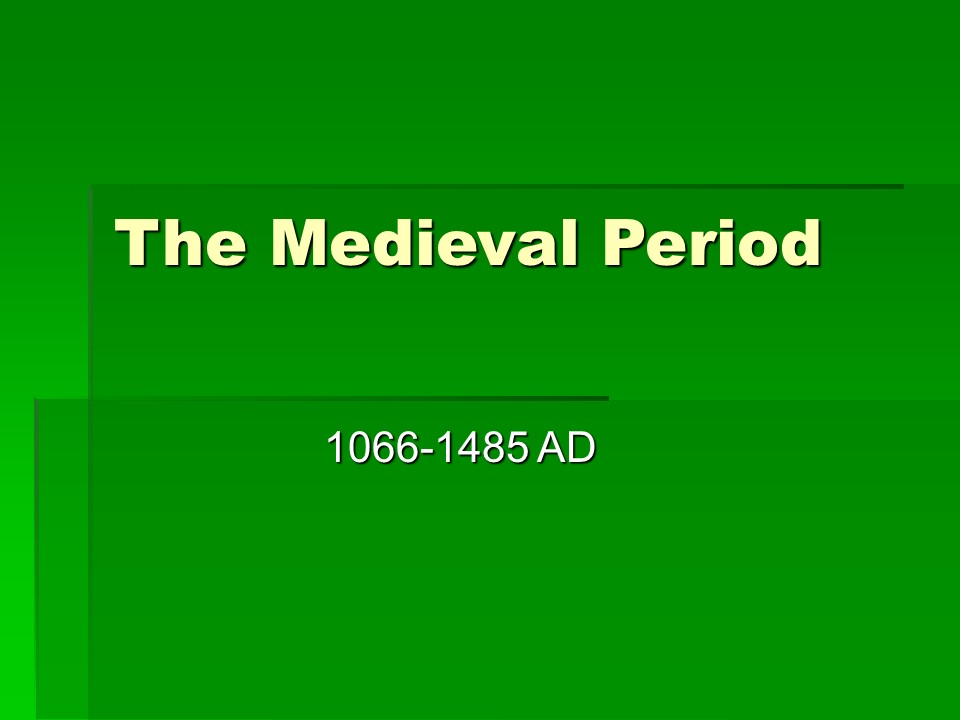The Medieval Period - PowerPoint PPT Presentation
1 / 26
Title: The Medieval Period
1
The Medieval Period
- 1066-1485 AD
2
1066
- The year the Normans defeated the Anglo-Saxons at
the Battle of Hastings. - William the Conqueror, a Norman (French), was now
King of England.
3
I. Norman Rule in England
- The A-S culture and Norman/French culture
blended. - Normans ruled less than 100 years
- 1. Brought Feudalism land divided among noble
barons. Knights served barons. Lowest class were
the serfs or peasants.
4
II. The Royal Houses of Plantaganet, Lancaster,
York
- 1154-end of Norman Rule, beginning of Royalty
- Plantaganet Rules
- 1. 1st one-Henry IIIncreased Kings power and
took it from the barons. - a. wanted also to lead Roman Catholic
church. He had Archbishop Thomas Becket of
Canterbury murdered 1170.
5
Continued..
- 2. 1215-King John signed Magna Carta. In this
document, he agreed not to raise taxes without
consent of barons. - 3. OthersRichard the Lionhearted, John, Edward
I, Richard II (last one)
6
C. Lancaster Rulers
- 3 Kings Henry IV, V, VI
- Henry VI-went insane-gave rule to uncle, the Duke
of York, while he recuperated. - 1455-Henry VI got better, wanted throne back.
Duke fought wonwar 30 years. War of the Roses
7
D. York Rulers
- 1st one-Edward IV-encouraged Wm. Caxton to make
printing press. - Edward V-only 12 yrs old when he takes
throneUncle Richard III takes overkills Ed V
and his brotherthen takes throneRichard III
killed in battle b/c of this. - Henry Tudor takes over, distant relative of
Lancasters.
8
Chivalric Live in Medieval England
- Knights fought French, journeyed to Holy Lands,
jousted in tournaments. - Chivalry ideal knights must live byhonorable,
courteous, generous, brave, skillful in battle,
respectful of women, helpful to weak.
9
IV. Religious Life
- Roman Catholic Church all belongedBarons,
Knights, serfs - Knights fought for Churchcrusades for Holy Land
- Cathedrals were built during this time
- Those who went on Crusades were influenced by
Moslems, natives of the Holy Land, through Arabic
numerals, Algebra, and Arabic medicine.
10
V. City Life
- 1349Black Death/Bubonic Plague killed 1/3 of the
people of England. - After plaguecities sprung up everywhere
- Work Guilds formed
- End of Knighthoodinvention of gunpowder.
11
VI. Storytelling
- Romances stories with a blend of chivalry,
touches of love, magic marvels - Folk Ballads stories sung by common people.
12
VII. Pilgrimages
- -long trips/journeys to holy places, popular in
Medieval Christianity. - -pilgrims travel long distances to toms of saints
or other shrines (Rome, Holy Land) - -pilgrims ask for divine assistance, give thanks,
ask for miracles, do penance, show devotion. - -they felt pilgrimages were essential to
Christian beliefs - -some still take pilgrimages today.
13
Canterbury, England
- About 50 miles SE of London
- Major destination for English pilgrims
- Site of Beckets murder in 1170
- People flooded to Cathedral to pay respects.
14
Geoffrey Chaucer
- 1343-1400
- Son of a wealthy merchant
- Became a page in a royal house
- Soldier, diplomat, royal clerk
- 1359 captured during war, and his ransom paid by
the king - Traveled extensively throughout his employment
15
Chaucer continued
- Father of English Poetrypoems have never gone
out of print was even popular in his own day. - Buried in Westminster AbbeyPoets Corner
16
Frame Tale
17
The Canterbury Tales
- The story of a group of 29 pilgrims (plus the
narrator) from varied walks of life who are
traveling from London to the shrine of Saint
Thomas a Becket at Canterbury (about 50 miles). - The tales are stories they tell to pass the time
as they travel. - Pilgrims are gathered at The Tabard, an inn, at
the beginning of the poem.
18
- Each pilgrim was to tell 2 tales on the way to
Canterbury, and 2 on the return journey. - Prologue to The Canterbury Tales describes each
pilgrim.
19
Pre-reading Vocabulary
- Absolution
- Accrue
- Adversity
- Apothecary
- Astrology
- Privy
- Relic
- Wend
- Intoning
- Penitents
- Chivalry
- Ecclesiast
- Eminent
- Felicity
- Parley
- Pestilences
- Sanguine
- Ulcer
- Solicitous
20
More Vocabulary
- Gobbet
- Mantle
- Palmers
- Amend
- Array
- Broad
- Dumb
- Tillage
- Fortune
- Wend
- Mercenary
- Consort
- Choleric
- Prevarication
- Pardoner
- Tithes
- Wallet
21
Vocabulary with Definitions
- Wend-to travel
- Chivalry-the qualities of a perfect knight, such
as courtesy, bravery, helpfulness, respect for
women - Intoning-saying or reciting in a singsong
chanting - Solicitous-full of concern
22
- Penitents-persons who regret and want to make up
for wrongdoing - Absolution-formal forgiveness of sins
- Eminent-famous outstanding
- Accrue-to come as an increase or addition
- Sanguine-having a healthy, reddish complexion and
a cheerful manner
23
- Felicity-happiness a source of happiness
- Pestilences-highly contagious and dangerous
diseases plagues - Adversity-misfortune trouble
- Mercenary-a person who works only in order to
make money - Consort-a companion wife or husband
- Choleric-bad-tempered
- Prevarication-the act of lying evasion
24
- Amend-improve
- Apothecary-druggist
- Array-a large group or collection
- Astrology-the planets positions supposedly
determined the best time to treat a patient - Broad-bluntly plainly
- Dumb-silent
25
- Ecclesiast-clergyman
- Fortune-fate
- Gobbet-piece
- Mantle-cloak cape
- Palmers-pilgrims who wore palm leaves as a sign
that they had visited the Holy Land - Pardoner-a clergyman licensed by the Pope to
collect money for the Church
26
- Parley-a discussion, as with an enemy
- Privy-secretive
- Relic-an object cherished for its association
with a saint or holy person - Tillage-plowing
- Tithes-payments made to the Church consisting of
one-tenth of a persons income - Ulcer-open sore
- Wallet-pack knapsack

